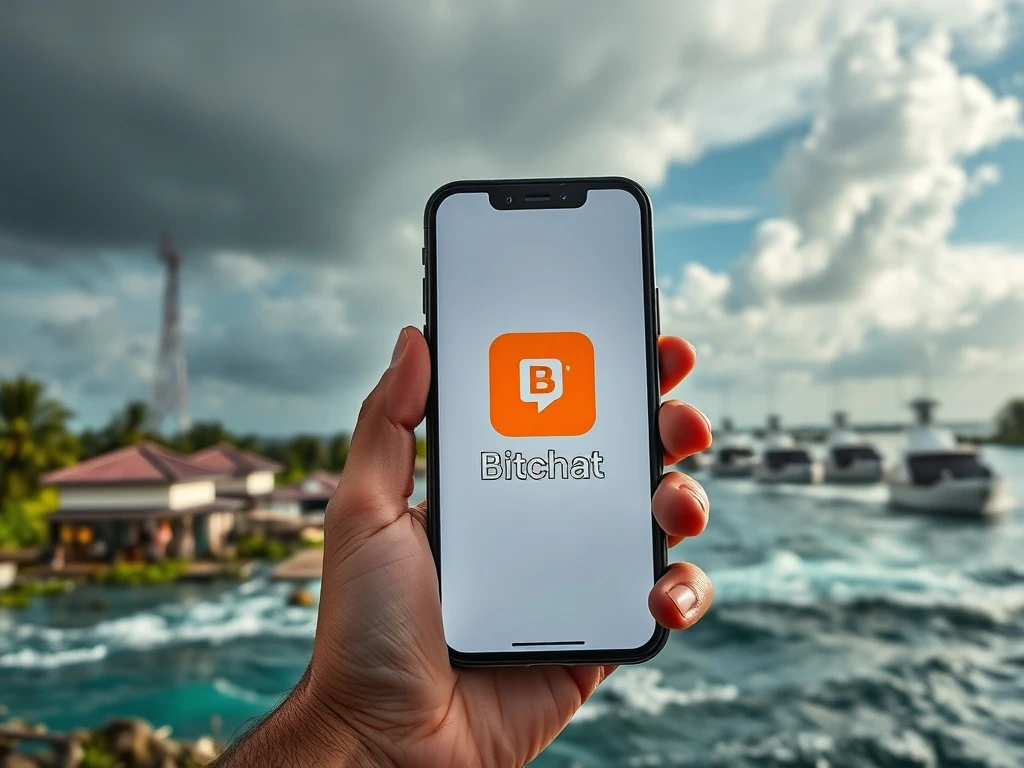Bitchat App Becomes Critical Lifeline in Hurricane-Struck Jamaica, Tops App Charts

In times of crisis, reliable communication becomes paramount. As Hurricane Melissa unleashed its devastating force across the Caribbean, particularly in Jamaica, a decentralized solution emerged as a beacon of hope. The Bitchat app, a peer-to-peer messaging service, remarkably surged to the second-most downloaded application on local app charts Jamaica, offering a vital link for millions facing internet outages.
Bitchat’s Unprecedented Surge: A Lifeline in Hurricane-Struck Jamaica
Hurricane Melissa brought 185-mile-per-hour winds, battering the Caribbean and severely disrupting traditional communication infrastructure. Consequently, internet access faltered across the region. In this challenging environment, the Bitchat app quickly became an essential tool. It climbed to the #2 spot on both the Apple App Store and Google Play in Jamaica, trailing only the weather forecast platform Zoom Earth. This indicates the immediate needs of the population: understanding the storm’s path and maintaining contact with loved ones.
The app’s success stems from its unique design. Bitchat leverages Bluetooth mesh networks, enabling internet-free communication. This capability proved indispensable when conventional networks failed. For Jamaica’s 2.8 million residents, Bitchat provided an encrypted, secure, and most importantly, operational channel for communication amidst widespread destruction. This rapid adoption highlights the critical role decentralized technologies can play during natural disasters.

Decentralized Messaging: A Robust Solution Beyond Censorship
Traditionally, the drive for decentralized messaging apps like Bitchat has focused on resisting censorship and government interference. Users often migrate from centralized platforms due to concerns over content moderation or data privacy. However, recent events, particularly the Jamaica hurricane, underscore a new, equally critical application for these technologies: providing resilient communication during infrastructure collapse.
Jack Dorsey’s vision for decentralized peer-to-peer systems emphasizes user control and robust, censorship-resistant networks. Bitchat embodies this principle, offering encrypted communication that operates independently of centralized servers. This architectural choice makes it inherently more resilient to both deliberate shutdowns and accidental outages caused by natural catastrophes. Therefore, its rise on the app charts Jamaica signifies a paradigm shift in how people perceive and utilize communication tools in emergencies.
Global Adoption Trends and the Quest for Communication Freedom
The surge in Bitchat downloads during the Jamaica hurricane is not an isolated incident. Across the globe, similar patterns of adoption emerge whenever traditional communication channels face disruption. For example, in September, Bitchat downloads significantly increased in Nepal. This occurred amid government corruption concerns and a social media ban that blocked major platforms like Facebook, Instagram, WhatsApp, and YouTube, triggering widespread protests.
A week earlier, downloads also rose in Indonesia during periods of social unrest. Later that month, Madagascar experienced a similar trend as protests erupted over ongoing water and power cuts. These instances collectively demonstrate a growing global demand for resilient and uncensorable communication tools. People seek platforms that ensure their voices can be heard and connections maintained, regardless of external pressures or environmental challenges.

The Future of Internet-Free Communication and Digital Rights
The importance of internet-free communication extends beyond natural disasters and government bans. In the European Union, a controversial “Chat Control” law has been under consideration. This proposal aims to eliminate encrypted messaging, potentially forcing apps like Telegram, WhatsApp, and Signal to allow regulators to screen messages before encryption. Such a measure would fundamentally undermine privacy and the security of digital communication.
Germany notably expressed strong opposition to this proposal, arguing that scanning private messages is unconstitutional. Consequently, the vote has been postponed, with another vote set for early December. This ongoing debate highlights the broader struggle for digital rights and the increasing value of decentralized, encrypted platforms. Bitchat’s success during the Jamaica hurricane serves as a powerful testament to the urgent need for communication tools that prioritize user autonomy and resilience against all forms of disruption.
As the world grapples with escalating climate events and evolving digital censorship landscapes, the demand for robust, decentralized solutions will only grow. The Bitchat app, by proving its worth on the app charts Jamaica during a catastrophic event, firmly establishes itself as a critical player in the future of global communication.









